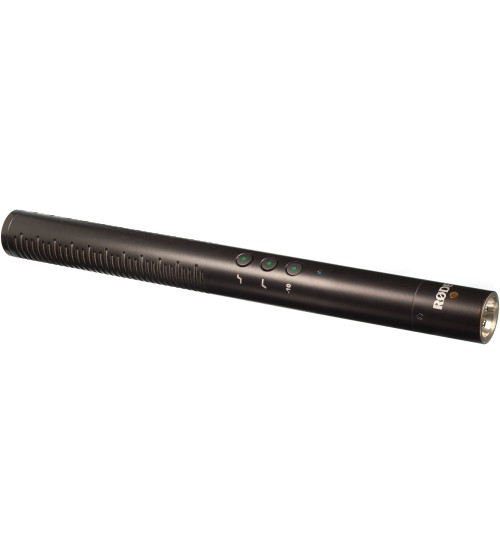Rode NTG4 Directional Condenser Microphone
The Rode NTG4 Shotgun Microphone with Digital Switches is designed for ENG, filmmaking, field recording, sound design, and broadcast applications. The microphone builds upon the success of the companys NTG1 and NTG2 microphones with an updated capsule to deliver broadcast quality sound and digital switching options for versatile field operation.
Designed to be mounted on a boom, a handheld pistol grip, or atop a compact camera for run and gun style filmmaking, the microphone features a super-cardioid directional pickup pattern, a frequency range of 20 to 20,000 Hz, a sensitivity of -32 dB re 1 V/Pa, a dynamic range of 119 dB, a signal to noise-ratio of 78 dB SPL, and a maximum SPL of 135 dB from 48V, 24V, or12V phantom power (4.5 mA current draw).
Along the body of the microphone is a power button with LED indicator as well as three digital switching buttons with LED indicators.
The first button provides a -10 dB pad on the input of the microphone to allow the recording of loud sounds without clipping.
The middle button turns on a 75 Hz high pass filter which is useful for reducing low frequency and infrasonic rumble from HVAC systems indoors or street traffic outdoors from over-powering the recording.
The third button is a high frequency boost. The value of the high frequency boost is in restoring some of the high frequency content that is often lost when a blimp or furry windshield is placed over the microphone. An added benefit is that the high frequency boost switch can help improve the intelligibility of recorded speech, especially useful for filmmaking and broadcast applications.
The microphone comes with an RM5 microphone clip, a foam windshield and a ZP1 pouch.
-10 dB Pad
Attenuates the microphone input to allow for
the recording of loud sounds without clipping
75 Hz High Pass Filter
Reduces low frequency and
infrasonic rumble from HVAC systems indoors or street traffic outdoors from
over-powering the recording
High Frequency Boost
Restores some of the high frequency
content that is often lost when a blimp or furry windshield is placed over the
microphone and improves the intelligibility of recorded speech
Setting Memory
Recalls the digital switch settings when
the microphone is powered on and off
| Acoustic Principle | Line gradient |
| Directional Pattern | Super-cardioid |
| Frequency Range | 20 to 20,000 Hz (selectable HPF at 75 Hz) |
| Sensitivity | -32 dB re 1V/Pa (25 mV at 94 dB SPL) ± 2 dB at 1,000 Hz. |
| Output Impedance | 200 ohm |
| Equivalent Noise | 16 dBA SPL (per IEC651) |
| Maximum Output | 7 dBu (at 1 kHz, 1% THD into 1 kOhm) |
| Dynamic Range | 119 dB (per IEC651) |
| Maximum SPL | 135 dB |
| Signal to Noise Ratio | 78 dB SPL (per IEC651) |
| Battery | Not applicable |
| Output Connection | 3-pin XLR, balanced output between Pin 2 (+), Pin 3 (-) and Pin 1 (ground) |
| Dimensions | 0.87 x 8.86" (22.00 x 225.00 mm) |
| Weight | 4.44 oz (126.00 g) |
| Technical | |
| Warranty | 1 Year Service & Spareparts |



